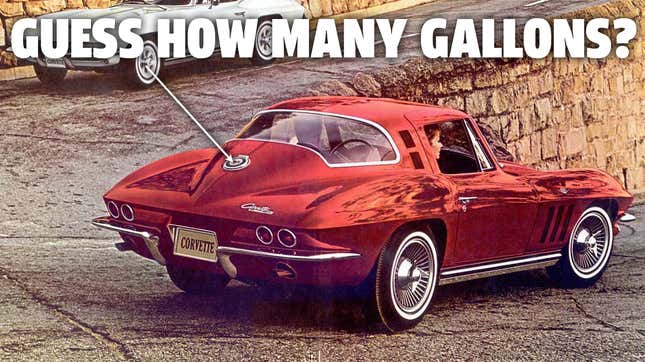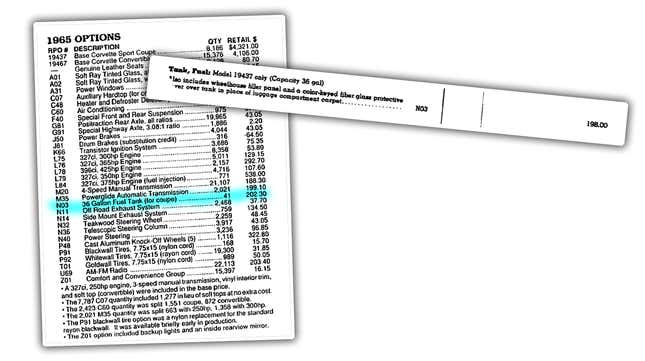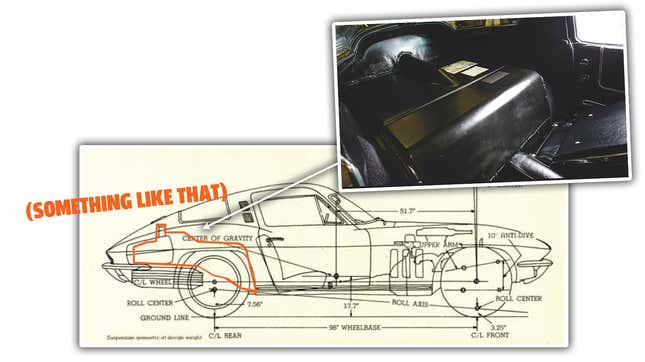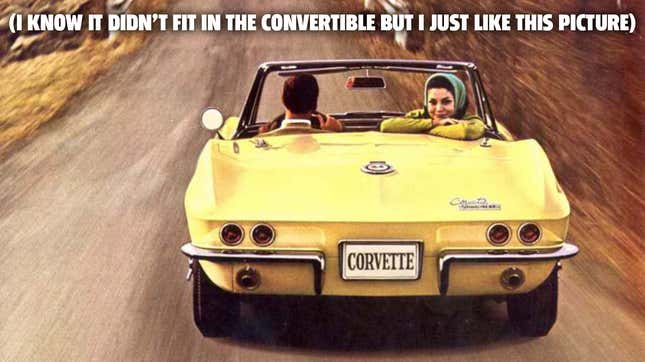
Earlier today, when I was taking the piss from that New York congressional candidate who claims to use about 60 gallons of gasoline per week, I found myself researching fuel tank sizes of various cars in a vain attempt to figure out what the hell this guy must be driving. I never really hit on a definite answer, but in this research I learned something I never knew before: Chevrolet once offered the Corvette with a “big tank” option. And the “big” in that name really isn’t kidding.
In the context of the N03 option package, priced at $198 in 1965 (that’s about $1,747 today) “big” means 36.5 gallons, 16.5 gallons more than the stock Corvette’s 20 gallon tank:

That’s an absurdly huge gas tank to have on a car, especially a car the size of a C2 Corvette coupe, which is what this option was available for, from 1963 to 1967.
Thirty-six and a half gallons! I’m not exactly sure why this massive tank has such an effect on me, but I can’t quit thinking about it. Average Class C RVs have 25 gallon tanks. My huge-ass RV has a 40 gallon tank, only 3.5 gallons more than the two-seater Corvette and it’s hauling around a shower and refrigerator and a couple of beds.

The Big Tank came with a fiberglass cover that made a new, smaller, and un-carpeted luggage platform, taking up most of the lower rear interior of the car.
The huge tank was offered to make the car better for racing, with that huge tank, it wouldn’t need to pit as often, and, remember, this is from the days before common fuel cells were used.
The Big Tank was usually part of the first of the now numerically famous Z06 “special performance equipment” option package. Included with that huge tank you got a meatier front sway bar, better brakes (bigger drums, vacuum booster, cooling scoops and backing plates) along with heavier-duty shocks and springs, and, of course, the 360 horsepower 327 cubic-inch V8, so you had something to burn through all of those 36 gallons.
I’m pretty sure—not quite certain yet, but close—that this combination of car-to-fuel-tank-size makes it the smallest car with the biggest fuel tank ever built and sold by a major automaker.
Of course, they didn’t really build or sell all that many—in 1966, for example, only 66 buyers opted for the huge fuel tank, and most years were similarly low—41 in 1965, for example, which makes those that survive very desirable today.
Think about the kind of range you could get if you, say, swapped in a modern Chevy engine making about the same amount of power—maybe the 2.7-liter turbo inline-four from the Silverado.

That engine makes 310 horsepower and manages a combined 22 mpg pulling around the around 4,500 pounds of Silverado. In a 2,900 pound or so C2 Corvette, I’m sure it could make 25 mpg or better easy, giving the car a 900 mile range.
Holy crap. Driving just a bit carefully should let you break 1000 miles, I’d guess, though maybe you’d want a transmission with more than four gears. Still, if your goal is to have the most possible range with the most stylish car possible, an old Sting Ray with a four-banger and that massive tank would do the job really, really well.